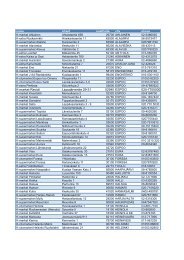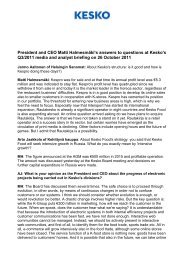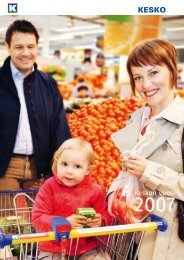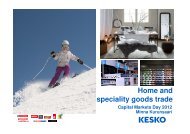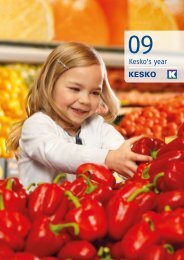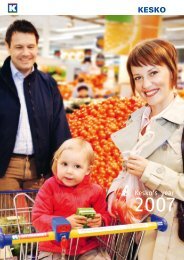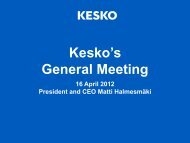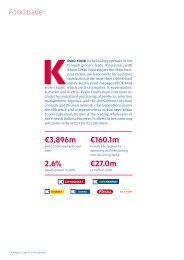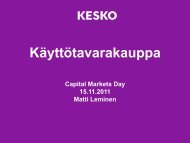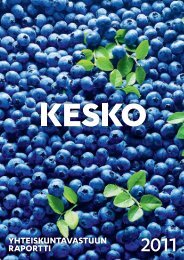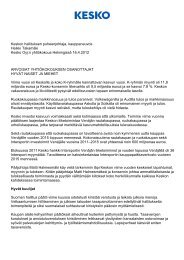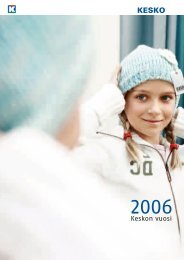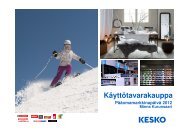Pdf version (3.2 MB) - Kesko
Pdf version (3.2 MB) - Kesko
Pdf version (3.2 MB) - Kesko
Create successful ePaper yourself
Turn your PDF publications into a flip-book with our unique Google optimized e-Paper software.
KNOw MORE,<br />
CONsUME LEss – THINK BLUE<br />
The Think Blue principle is an important<br />
element in Volkswagen's environmental<br />
responsibility. It encompasses car models<br />
featuring economical BlueMotion Technologies,<br />
more energy efficient car manufacturing<br />
methods, reducing the environmental<br />
impact of car factories, promoting<br />
the use of renewable energy sources, and<br />
not forgetting driving comfort and responsibility.<br />
Volkswagen also challenges<br />
its customers to work for the benefit of<br />
the environment. You can start with small<br />
steps and try tips on, for example, an economical<br />
driving style.<br />
USE THE HIGHEST GEAR POSSIBLE<br />
The most economical gear is always the<br />
highest possible, because it helps reduce<br />
fuel consumption significantly. Volkswagen's<br />
smart DSG transmission automatically<br />
selects the right gear.<br />
INDOOR gROUp pEOplE sET UP<br />
a BUs POOL FOR COMMUTING<br />
The offices of Indoor Group, which had<br />
been located in Lahti for years, were<br />
joined with the other <strong>Kesko</strong> functions in<br />
Hakkila, Vantaa in November 2009. The<br />
idea of bus pooling was born as most employees<br />
continued to be resident in the<br />
Lahti district.<br />
Now, after more than two years, there<br />
are still about 20 regular pool members<br />
USE ELECTRICAL DEvICES<br />
SPARINGLy<br />
Electrical car accessories provide comfort<br />
but increase consumption, if used<br />
unnecessarily. In sub-zero temperatures,<br />
for example, it is advisable to switch off<br />
seat heating as soon as the seat feels comfortable.<br />
AvOID MAKING REPEATED<br />
SHORT TRIPS<br />
The fuel consumption of a car engine is<br />
at its highest after cold start. If short trips<br />
only are made, fuel consumption can be<br />
as high as 30 l/100 km. It is advisable to<br />
try and combine as many errands as possible<br />
on the same journey, giving the engine<br />
time to warm up and consume less<br />
fuel.<br />
happily sharing the one-hour bus journey<br />
in the mornings and evenings. Commitment<br />
to a regular schedule gives much<br />
more than it takes. We have often talked<br />
about how economical and environmentally<br />
friendly our bus pooling is,” says<br />
Indoor Group's Communications Officer<br />
päivi Hurri.<br />
ClIMaTE CHaNgE WORK<br />
REDUCINg<br />
THE CaRBON<br />
FOOTPRINT FROM<br />
TRaNsPORTaTION<br />
A new type of trailer truck has been tested<br />
for the purpose of reducing the carbon<br />
footprint from K-food stores' transportation.<br />
A two-tier trailer – the first of its<br />
kind in Finnish retail distribution – was introduced<br />
for testing in September 2011.<br />
The new trailer will help us cut the carbon<br />
dioxide emissions from transportation by<br />
one third.<br />
“In the new trailer, products can be<br />
loaded on two decks, which means that<br />
one trailer carries more than double a<br />
normal load. It also means that less transportation<br />
is required and the carbon dioxide<br />
footprint is reduced by one third, says<br />
Mika salmijärvi, Managing Director of<br />
Keslog Ltd, the company responsible for<br />
K-food stores' logistics services.<br />
The new trailer is being tested on the<br />
long-distance route between Vantaa,<br />
in the south, and Oulu, in the north of<br />
Finland. The experiences so far have been<br />
good.<br />
Keslog's environmental system had its<br />
10th anniversary in 2011; the ISO 14001<br />
certificates granted to K-food stores' logistics<br />
operations in 2001 were the first of<br />
their kind in Finland. In addition to developing<br />
transportation, key elements in the<br />
environmental work in logistics include<br />
the continuous improvement of energy<br />
use and recycling efficiency. Long-established<br />
environmental work at all stages<br />
of the product and service chain has also<br />
produced results.<br />
“Our current waste recovery rate is<br />
approximately 94%, whereas in the late<br />
1990s, it was 70%. The waste generated<br />
is directed as extensively as possible to<br />
recycling and fuel production,” says Toni<br />
pelin, Keslog's Environmental and Safety<br />
Manager.<br />
The trading sector can offer customers<br />
environmentally friendly choices only<br />
by taking account of the environmental<br />
impact of its entire supply chain. This encourages<br />
Keslog Ltd and K-food stores to<br />
continue improving the environmental efficiency<br />
of their goods deliveries.<br />
<strong>Kesko</strong> Corporate Responsibility Report 2011 29



